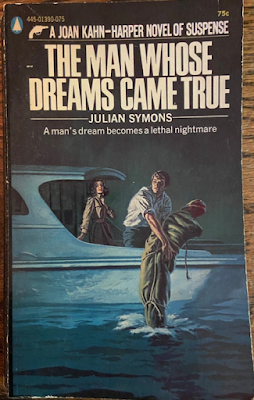Morrison Sharpe never intended to become a detective, but a murder takes place on a bus ride and its strange circumstances arouse his fascination with puzzles. He finds himself hovering around the police while they try to find the murder weapon and determine how the victim was shot on board the bus without anyone noticing. Sharpe cannot help but comment on what to him appears to be clearly obvious but goes unnoticed by befuddled Sgt. Matthews. Astonishingly, Matthews allows himself to be tutored in his own profession by this crossword puzzle expert. Sharpe is rather proud of himself and a not a little egotistic, but his lectures on “logic” and detection” are often specious. For instance, there is a man in an overcoat who the police are trying to track down. This man was seated near the victim and is now nowhere to be found. Matthews is sure he got off when the driver pulled the bus over after the body was discovered. Sharpe offers up ideas that it could be one of the passengers who remained on board and wore the overcoat to disguise themselves but never addresses what happened to the coat after the crime.
As the story progresses Sharpe’s approach to police work relies on this so-called logic and he is constantly advising Matthews and his inspector superior of possibilities neither of them have entertained. However, he tends to go for the fanciful rather than the obvious. And he is so seduced by his logical approach drawing analogies to the cool processes he employs in working out chess problems or solving tricky wordplay in crosswords that he often comes across not exciting but colorless. When he suggests that the killer took advantage of the faulty mechanics of the bus that is always backfiring and timed the firing of the gun so that it was mistaken for another backfire the police ask him then what happened to the gun. Sharpe dismisses this as unnecessary and tells them it will turn up eventually.
Another of his tactics has nothing to do with logic but everything to do with manipulation. He allows the witnesses to talk endlessly hoping that they will reveal themselves in an unprovoked aside or passing tangential comment. Sharpe is good at catching people in lies not because he’s particularly clever or knowledgeable, but because the police are lazy and shortsighted. When someone mentions being served by a waiter at the Golden Lion Hotel Sharpe goes there and learns that the hotel does not employ any waiters but only waitresses. The police never bothered to follow up on that fact. This kind of contrast between professional police carelessness and amateur sleuth genius is contrived.
Death Goes by Bus aspires to be an impossible crime murder mystery, but never really achieves the level of complexity that Cargill hopes for. Sharpe spends much of the book criticizing the police and bragging he knows who killed Caleb Wainwright on the bus, but of course never really shares any of his theories until Cargill sees fit to reveal it to us as readers in the final chapter. The suspects are far more interesting than the detective. When the story turns into one of a massive criminal conspiracy it almost seems as if Cargill has created a version of Murder on the Orient Express on a passenger bus. Nearly everyone on board knew the victim, it will turn out, and many of the passengers have crime in their past. There are cover-ups and betrayals and a plethora of lies to hide the murder motive and the relationships among the passengers and to the victim.
 | ||
| Paperback reprint in Italian translation (RCS-Corriere della Sera, 2016) | |
Ultimately, the book and its protagonist are a failure. For in the end the impossibility is never fully explained. Sharpe may have uncovered the preposterous conspiracy, unmasked all the crooks and thieves, explained why Caleb Wainwright was shot but never how it all happened. In presenting an impossibility in a murder mystery the author is bound to a tacit pact with the reader to explain everything, not gloss over it out of indifference or laziness. This one very long thread left hanging is infuriating.
Cargill’s books are rather hard to find and I know of only one other Morrison Sharpe book as identified in my edition Hubin’s Crime Fiction which is Heads You Lose (1938). Hardly anything is written about Cargill or his books anywhere. And based on this one book I’m not surprised. There is only one somewhat praiseworthy snippet for Morrison Sharpe and that comes from A Catalogue of Crime (rev., 1989). Of Death Goes by Bus Jacques Barzun wrote: "As routine crime-and detection of its period, this is not a bad work. But it is overlong and the reader becomes skeptical as more and more of the strangers on the bus are found to have dire connections, criminal and passionate. The best part of the tale is the thought and behavior of Mr. Morrison Sharpe, the chess and puzzle expert, who can think one move ahead of both crooks and police. He is quaint and eccentric in just the right way, though short of memorable." Typical of Barzun, sort of damning with faint praise. Here’s one forgotten and neglected detective who just doesn’t excite me at all.

























